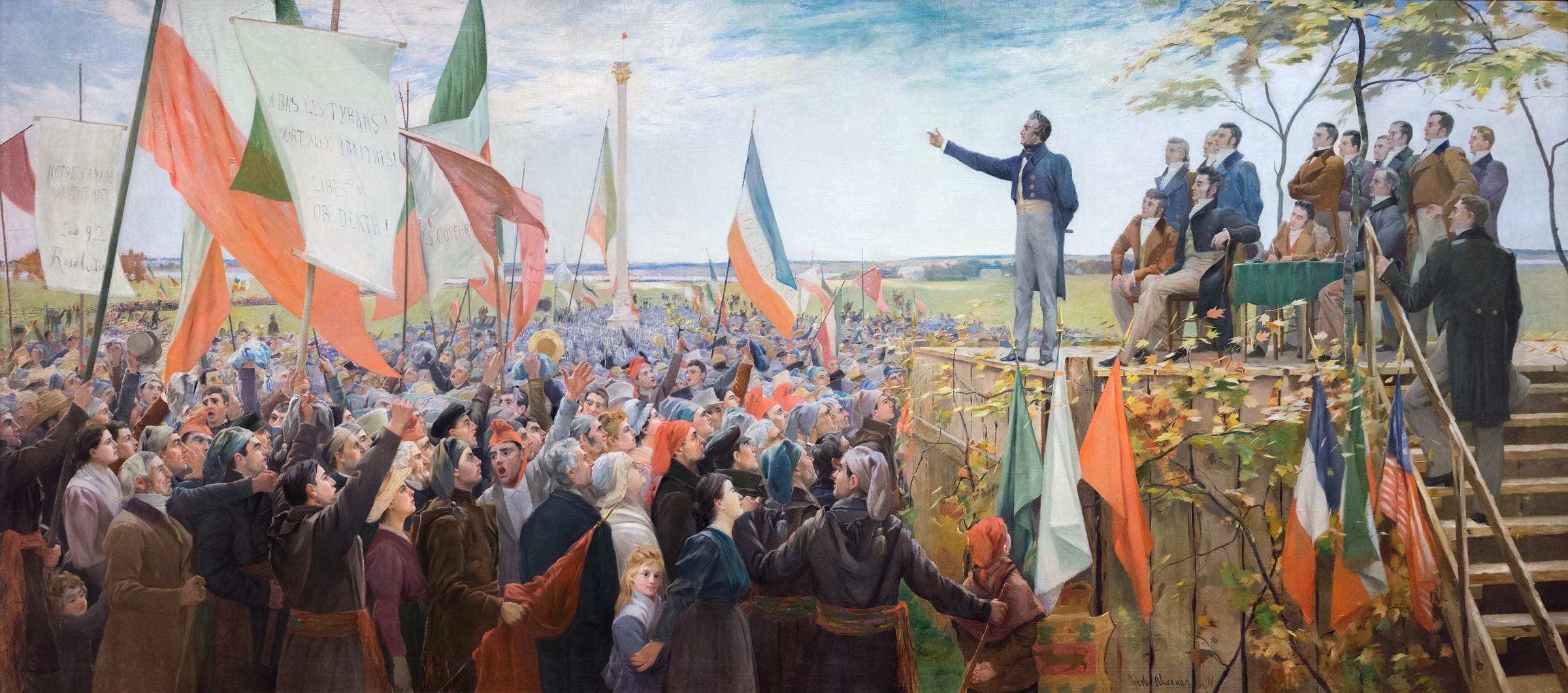Here's to Celebrating the Patriots' Revolt—and not the Queen
One of these May holidays reflects Canadian values, and the other doesn't.
On the Monday preceding May 25th, Victoria Day is celebrated across nine of ten Canadian provinces. What is it about? Nobody in Canada seems to know. In second-largest Canadian province, Quebec, Victoria Day is replaced by La Journée Nationale des Patriotes, which celebrates the 1837-38 French Canadian rebellion against imperial British rule, under which francophones (the majority in the colony of Lower Canada) were second-class citizens. This seems like a worthy cause to celebrate.
Back to Victoria Day. I read the Wikipedia page, and apparently it’s about this old British gal who never even visited Canada but who happened to be the queen when Canada was confederated in 1867.
Being a republican myself, I don’t care much for the monarchy.1 Victoria once said, “Give my people plenty of beer, good beer and cheap beer, and you will have no revolution among them.” And while I appreciate Vicky’s respect for man’s finest beverage, I don’t like her patronizing attitude. That American dog in me warns against people who try to suppress democratic revolution, be it through beer or guns.

When it came to the Patriots’ rebellion against British rule in 1837, the Brits opted for guns over beer and allowed paramilitary organizations to be assembled to suppress the French Canadian democratic movement led by Louis-Joseph Papineau.2 (It goes without saying that this democratic movement unfortunately did not take into consideration the interests of indigenous people living in Lower Canada.) Many of the French Canadian revolutionaries were imprisoned, exiled to penal colonies, or put to death by the British.
The French Canadian majority in Lower Canada had no real political power under British rule. Their not-very-democratic Legislative Assembly could be overruled by the British Governor, who represented the crown. British merchants and the anglophone elite of Montreal controlled most economic resources. Before the rebellion, London had rejected in entirety the 92 Resolutions, a document put forward by the Parti canadien that demanded democratic political reforms and recognition of French Canadians' linguistic and cultural rights, among other things.
But the rebellion was not merely a conflict between anglophones and francophones. As Joseph Facal wrote in Le Journal de Montréal:3
Certainly there were cultural and linguistic animosities. However several anglophones, especially those from an Irish background, were members of the patriot camp and fought against British imperialism. Several francophones, on the other hand, had advantageous social positions and supported the status quo controlled by London.
The patriots fought not only for an independent republic, but also had demands concerning universal suffrage, free education, the death penalty, equality of rights and others. They were inspired by the great principles of the century of Enlightenment and by other emancipation movements on the American continent.
Anglophones should celebrate the Patriots’ Rebellion, too
Federalists often argue that Canada is a pluralist country built on two founding nations: one French and one English. As they view it, Quebec—the heart (though not the only part) of French Canada—is a special and integral part of their country. It is, in many ways, what makes Canada Canadian.
I in large part agree.4 Lots of Québécois feel the same. But many don’t: in the 1995 Quebec sovereignty referendum—in which 94% (!) of eligible Quebec voters participated—49.42% of voted to leave Canada. Evidently, many Québécois feel that they are a distinct and separate nation from the rest of Canada, one that deserves its own country.
And today while many francophones celebrate an anti-imperial democratic rebellion, most of English Canada celebrates the very royal family that the French Canadians were fighting against! I’m sure this irony is not lost on Quebec separatists.
It seems clear to me that La Journée Nationale des Patriotes is a more worthwhile holiday to celebrate than Queen Victoria’s birthday—no matter your maternal language or what province you reside in. As a recently arrived resident of Canada, perhaps you think I don’t have the right to tell you which holiday to celebrate. Well . . . sorry.
I’ve written extensively on many controversial topics, including Israel, shrimp welfare, wokeism, Donald Trump, and the Ukraine War. But never have I received more hate mail in response to an article than when I opined on the political tensions between anglophones and francophones in Quebec. And to be honest, it gave me a rush, so bring it on.
I agree with what Yves Boisvert wrote: “If some Canadians enjoy having a monarchy so much, can we at least suggest that it should be one made in Canada – with our Queen wearing a beaver fur coat of some sort?”
Papineau was not a faultless character—he supported the feudal seigneurial land distribution system.
I found this on David Rand’s blog—I assume he translated it into English.





Beer as God’s finest beverage is ludicrous. Call this Theo’s Terrible Take
I don’t actually think it matters very much what a holiday was originally about. Only weather the people enjoy it and its present effects. For example, lots of monuments and an airport in Mongolia is named after genghis Khan, a brutal conquerer who killed like 10% of the world population. It seems obvious that it’s not actually morally bad of the people to celebrate him, even though you could make a possible argument that the guy is among the worst people to ever live in terms of body count. If you would not Morly judge someone for celebrating someone with his body count, it doesn’t make much sense to condemn a holiday for celebrating a queen who wasn’t anywhere near as bad. After all celebrating it in the hear and now isn’t actually going to make bad things more likely in the past, it’s just an excuse for the people to have a little fun.